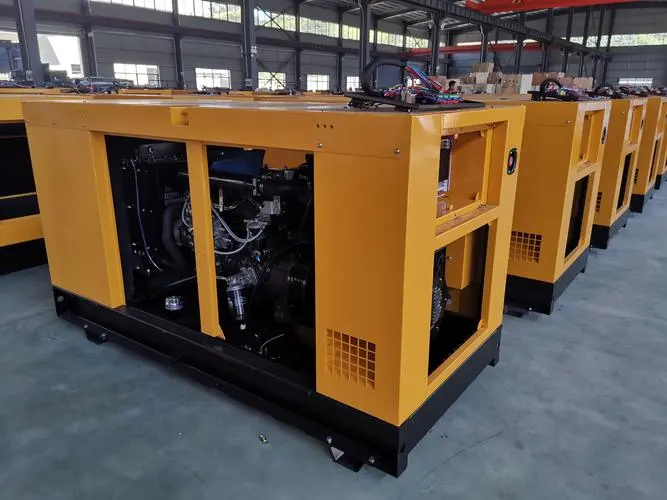The Essential Guide to Diesel Generators for Backup Power

Introduction
In today's fast-paced world, uninterrupted power supply is crucial for both individuals and businesses. Power outages can occur due to various reasons such as natural disasters, equipment failures, or grid overloads. To ensure continuous operations and prevent disruptions, many people rely on backup power sources like diesel generators. In this comprehensive guide, we will explore the benefits, features, applications, and maintenance of diesel generators for backup power.
Chapter 1: Understanding Diesel Generators
1.1 What is a Diesel Generator?
A diesel generator is a type of backup power system that uses a diesel engine to generate electricity. Unlike traditional generators that run on gasoline, diesel generators are more fuel-efficient and provide a reliable source of power during emergencies. The diesel engine drives an alternator to produce electrical energy, which can then be used to power various devices and appliances.
1.2 How Does a Diesel Generator Work?
The operation of a diesel generator involves several key components working together. When the generator is started, the diesel engine begins to rotate, which in turn spins the alternator. The alternator converts the mechanical energy from the engine into electrical energy, which is then distributed through the generator's outlets. The generator can be connected to a building's electrical system to provide backup power during outages.
Chapter 2: Benefits of Diesel Generators
2.1 Reliability
One of the primary advantages of diesel generators is their reliability. Diesel engines are known for their robustness and durability, making them well-suited for continuous operation over long periods. Diesel generators can provide backup power for extended durations without compromising performance, making them ideal for critical applications such as hospitals, data centers, and telecommunications facilities.
2.2 Fuel Efficiency
Diesel generators are more fuel-efficient compared to gasoline generators. Diesel fuel has a higher energy density, which means that diesel engines can generate more power using less fuel. This efficiency not only reduces operating costs but also ensures that the generator can run for longer periods without the need for frequent refueling.
2.3 Longevity
Diesel generators are designed to last for many years with proper maintenance. The robust construction of diesel engines and generators allows them to withstand harsh environmental conditions and heavy usage. This longevity makes diesel generators a cost-effective investment for businesses and individuals looking for a reliable backup power solution.
Chapter 3: Applications of Diesel Generators
3.1 Residential Use
Many homeowners use diesel generators to provide backup power during blackouts or emergencies. A diesel generator can keep essential appliances running, such as refrigerators, lights, and heating systems, ensuring the comfort and safety of residents during power outages.
3.2 Commercial and Industrial Use
Businesses and industries rely on diesel generators to maintain operations during power interruptions. Critical facilities such as hospitals, manufacturing plants, and data centers use diesel generators to power essential equipment and systems, preventing costly downtime and ensuring business continuity.
3.3 Construction Sites
Construction sites often operate in remote locations or areas with unreliable power supply. Diesel generators are commonly used on construction sites to provide electricity for tools, equipment, and temporary facilities. The portability and robustness of diesel generators make them well-suited for the demanding conditions of construction projects.
Chapter 4: Selecting the Right Diesel Generator
4.1 Power Requirements
When choosing a diesel generator, it is essential to consider your power requirements. Calculate 75kw diesel generator for remote scientific projects of the appliances and equipment you need to power during an outage to determine the size of the generator you need. Oversizing or undersizing a generator can lead to inefficiencies and potential damage to equipment.

4.2 Fuel Capacity
The fuel capacity of a diesel generator determines how long it can run before needing a refill. Consider the expected duration of power outages in your area and choose a generator with an appropriate fuel tank size to meet your needs. Some diesel generators come with extended fuel tanks or the option for external fuel connections for added convenience.
4.3 Noise Levels
Diesel generators can be noisy during operation, which may be a concern, especially for residential or urban environments. Look for generators with noise-reducing features such as sound-attenuated enclosures or mufflers to minimize noise levels. Consider the decibel rating of the generator to ensure it complies with local regulations and does not cause disturbances.
Chapter 5: Maintenance and Care of Diesel Generators
5.1 Regular Inspections
To ensure optimal performance and longevity of your diesel generator, regular inspections and maintenance are essential. Inspect the generator for signs of wear, leaks, or damage, and address any issues promptly. Check the oil, fuel, and coolant levels regularly and follow the manufacturer's recommended maintenance schedule.
5.2 Load Testing
Periodic load testing of the diesel generator is crucial to verify its capacity and performance under actual operating conditions. Load testing simulates real-world scenarios and helps identify any issues with the generator's output or components. Conduct load tests at regular intervals to ensure the generator is ready to provide backup power when needed.
5.3 Fuel Quality
The quality of diesel fuel used in the generator can impact its performance and reliability. Use clean, high-quality diesel fuel that meets the specifications recommended by the generator manufacturer. Monitor fuel storage conditions to prevent contamination or degradation, which can lead to engine problems and reduced efficiency.
Conclusion
Diesel generators are a reliable and efficient backup power solution for residential, commercial, and industrial applications. Their robust construction, fuel efficiency, and longevity make them a popular choice for ensuring uninterrupted power supply during emergencies. By understanding the benefits, applications, and maintenance requirements of diesel generators, individuals and businesses can make informed decisions when selecting a backup power system. Invest in a diesel generator today to safeguard against power outages and keep your operations running smoothly.
